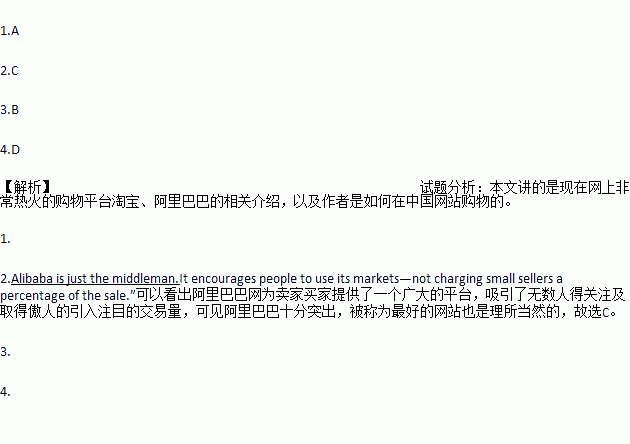题目内容
Alibaba started taking the lead in China, simply enough, by connecting big Chinese, manufacturers(制造商)with big buyers across the world. Its business-to-business site, Alibaba.com allowed business to buy almost everything. Alibaba’s advantage wasn’t hard to identify: size.
Alibaba is just big, even by Chinese standards. Its marketplaces attract 231 million active buyers, 8 million sellers, 11.3 billion orders a year—and Alibaba is just the middleman. It encourages people to use its markets—not charging small sellers a percentage of the sale.
If you want a quick look into the influence of Alibaba on daily Chinese life, take my experience. I moved to Beijing almost a year ago and quickly got tired of visiting small stores across the crowded, polluted city of 20 million people in search of new electronics, bathroom furnishings. “You’re looking for what exactly? Why not try it? ” my Chinese teacher asked me one day. With that, my wonderful new relationship with Alibaba began.
Alibaba’s original business-to-business model now is secondary to consumer buying. Chinese retail(零售)buying makes up 80% of Alibaba’s profit, and leading that group is Taobao, with 800 million items for sale and the most unbelievable selection of things you’ll ever find. TMall.com is Alibaba’s other big site, where you can find brand name goods from Nike and Unilever near the lowest prices.
What I have a hard time explaining to friends and family back in the U. S. is how China has gone beyond traditional shopping---big-box retailers(零售商)especially---in favor of online purchases on Taobao and a few other sites. In smaller towns than Beijing, where big retailers have not yet traveled, shopping online is shopping, and shopping is Taobao.
I have a list of some of my recent purchases on Taobao for a sense of how extensive(广泛的) the marketplace is. Almost everything arrived a day or two after ordering with free shipping. I’m not even a big buyer, because I need friends to help me search the Chinese-language site. When I was searching my purchase history on my Chinese teacher’s iPad, which helps me buy goods, I looked through with great difficulty about 10 of her purchases for every one of mine.
1.Alibaba’s advantage mainly lies in _________.
A. its big size B. its business-to-business service
C. its not charging small sellers D. its low price
2.We know from the passage that Alibaba___________.
A. Alibaba is of middle size among all the online sites
B. Alibaba will continue to develop
C. Alibaba stands out as the best online site
D. Alibaba acts as a bridge between the buyers and sellers
3.What can be inferred from the passage?
A. The author’s Chinese teacher is also an online purchase lover.
B. Taobao has no obvious advantage over other similar online sites.
C. Alibaba’s business-to-business service earns more money than retail now.
D. TMall.com provides more profit than Taobao.
4.What is the passage mainly about?
A. Shopping online is TaoBao.
B. The influence of shopping online goes beyond traditional shopping.
C. Alibaba greatly influences people’s daily purchase in China.
D. How the author purchases online in China.

